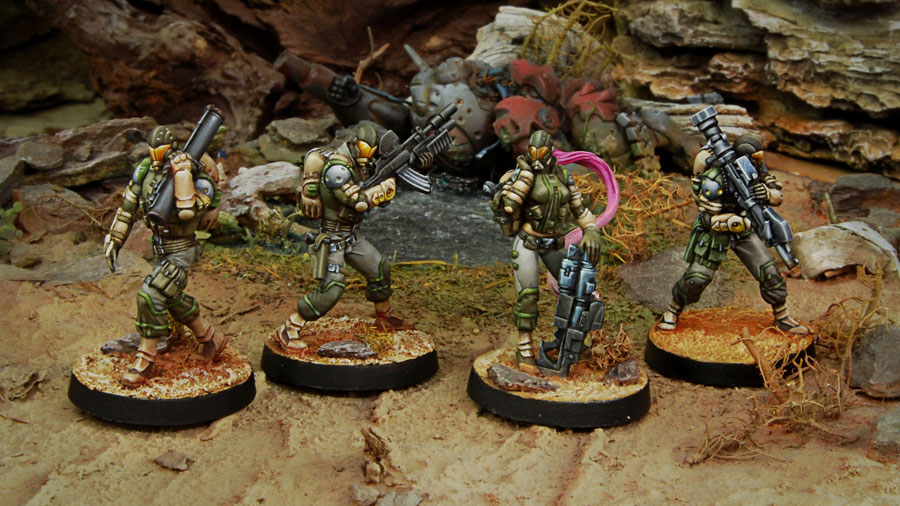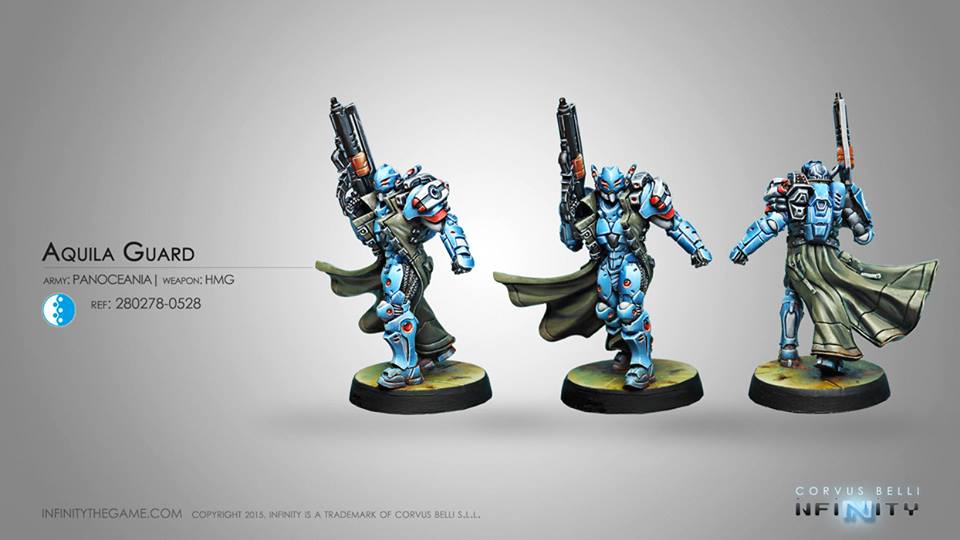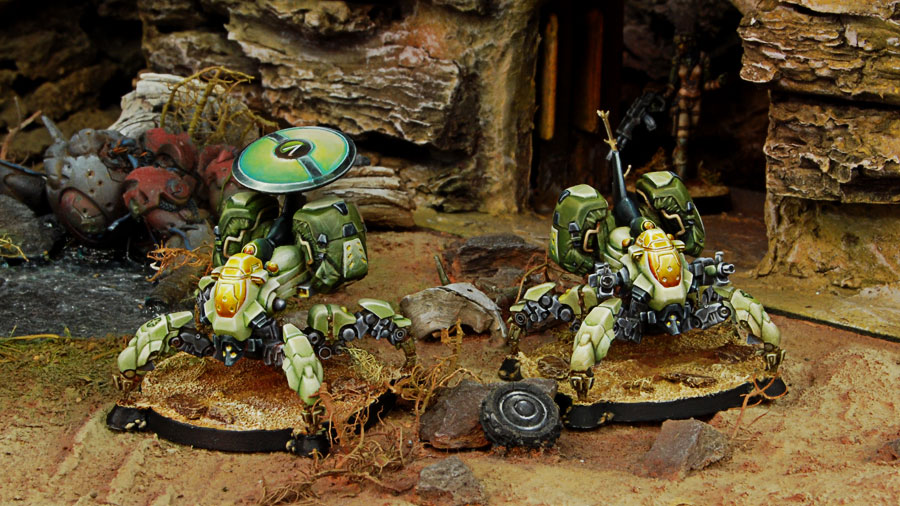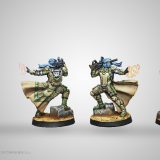Fireside Chats: Specialists and how to choose and use them
When I was new to Infinity, I was pretty happy when I got my first Kazak doctor and the Dozer engineer. I would try to heal my troopers and repair my trak muls. I liked special abilities which gave me more options to toy with.
Then I noticed that other people did not do this and later on realized why. Before the times of ITS, Paradiso and 20×20, specialists were rarely found in lists. Now the game has changed, and people feel the need to have up to half of their troopers being specialists. This is because of the Infinity Tournament System.
Realizing that the special abilities are hardly ever used, CB gave specialists a second power: Being the only troopers able to score objective points. On top of this, CB felt the need to expand the original special abilities a bit with the release of N3.
How many specialists are needed? In ITS, as many as you can afford because they are the only ones who can win you games. Your opponent will try to kill them, hence you need even more to compensate for your losses. Some people argue that 40% of your troopers should be specialists.
When writing lists for an ITS tournament, it is important to keep in mind that players may choose between two lists before every game after the classified cards have been drawn. Therefore there is no need to have every kind of specialist in both lists. At some events, you may even know the missions in advance. If one or more of the four ITS 2015 missions which do not require specialists will be chosen, you can afford to have one list with less specialists for those games. You may still want to field specialists in case you want to gamble on whether you get the right one for the classifieds. Fortunately, you may always choose the “Secure HVT” mission which does not require specialists.
The need for specialists in ITS apart from the value of their professional ability is a bit of a hamper for lists who don’t have much need for such abilities. Caledonians come to mind, for example.
In 20×20, you do not need to have specialists in your list at all. Specialists do have a 15 – 30% better chance at scoring objectives than other troopers. Not all specialists have this power in every mission, however. Which specialist gets the positive WIP modifier depends on the task at hand. While this system is unlikely to motivate people to include lots of specialists into their lists, players will try to get the specialists they have to the objectives.
Which troopers are the most valuable specialists? Honestly, in ITS and Paradiso, specialists are more needed to score than for their abilities that made them specialists. As objectives are generally found towards the middle of the table, the most desirable specialists are those who come with deployment skills such infiltration, mechanized deployment or airborne deployment. Protection in the form of high armour or camouflage is obviously a boon, too. The basic trooper profile specialist (a PanO Machinist, for example) is not so desirable.
With specialists being so important, let us have a look which specialists should be chosen. In the following rundown, I want to have a look at the abilities of the specialists besides grabbing objectives. This should help to decide on which ones to take.
Doctor
The doctor is certainly one of the most important specialists as they can bring your wounded troopers back to life. Or so I thought.
In games, however, healing does not happen that often because it is not the most efficient use of orders.
For example, a trooper who was shot into unconsciousness during the active phase on turn 2 will not generate an order in turn 3, the last turn of the game. What is the point in investing more than one order in an attempt to heal him? Unless this model is crucial for winning the game, you simply will not attempt to do that. Additionally, it is very likely that doctor and patient are far away from each other, which completely wrecks all hope for the doctor to work in her profession.
If you are after the healing role, put your doc next to your expensive fighters with rather static roles. Deploying the doctor next to your lieutenant also makes sense if you fear that your LT may get wounded in your own active turn. On top of it all, making a healing roll means that you only get the chance to heal a trooper. If you can’t or don’t want to spend a command token, it is very questionable whether you should invest your precious orders into doing that.
On a side note, I find it a bit hard to decide on whether I should try to heal troopers who have no wound incapacitation. They are still active even though they got shot, you want to heal them because they are valuable, but if the doctor fails then the trooper is removed from play!
CB realized that using doctors for actually healing people is often not the wisest choice. So the option of rerolling the dice at the cost of a command token was introduced. (Not available to Ariadna!) To combat the space problem, medics are now equipped with syringe pistols which allow doctors and paramedics to heal from a short distance.
There are a few doctors who have deployment skills. Those are the most efficient doctors. They have fast access to both objectives and your precious troopers who got wounded fighting in the front part of the battlefield. Together with hackers, such doctors are probably the most useful specialists in the game.
There are three scenarios in ITS 2015 were doctors get a bonus for scoring objective points. The classified deck has two missions where doctors or paramedics are needed.
In 20×20, doctors are quite useful. There are several secondary missions and a primary one where certain troopers (such as lieutenants or characters) are targeted. Healing troopers can thus deny the opponent objective points. In one 20×20 mission, you need to have a doctor to score an additional objective point.
In the Paradiso campaign, doctors improve the odds of keeping spec ops and characters alive via the post-game medevac rolls.
I think doctors are pretty good specialists considering how often they are beneficial for the mission and the simple fact that all lists contain troopers which can theoretically be healed.
Paramedic
Paramedics rely on medikits in order to heal. Healing via medikit has much lower chances than healing with the doctor skill (a doctor has at least 60% healing chances, the medikit varies from 35% to 50%.) Using the medikit remotely diminishes the likelihood of healing to an almost unacceptable risk considering the order costs.
A doctor is definitely a better healer than a paramedic. The paramedic is cheaper and it is often possible to turn a line trooper into a paramedic specialist for just a point or two more. A viable option for linked teams. Link team paramedics can be useful in their medical role to bring back wounded team members as they are close to them anyway. Paramedics are very likely specialists only to be used for their ITS objective grabbing powers.
There are three ITS missions in which paramedics just like doctors get a bonus to WIP rolls.
Paramedics are not counted in 20×20 to be specialists. There is one secondary mission where players benefit from having medikits as a means to score objective points. Just like doctors they have the ability to deny objective points by keeping a targeted trooper alive.
Engineer
Engineers can repair equipment, remotes and TAGs, remove superglue and detonate d-charges from far away. Sounds good at first. Well, it was obviously not good enough. With N3, failed attempts to repair a machine can be rerolled at the cost of a command token. With the deactivator, engineers gained the additional ability of clearing deployable weapons such as mines.
A deactivator as a tool for clearing mines seems to be not so useful since any rifle can do the same job, probably better. Engineers will not benefit from the +6 close range modifier of the deactivator if their target would automatically blow up in their face when getting that close!
Repairing machines has the same problems as healing troopers. Repairing equipment such as burnt ODDs is even more questionable as there is not even an order at stake.
Detonating d-charges from a distance may be good idea in some circumstances to avoid triggering AROs the troopers who placed the charges would be exposed to.
Obviously, to get the full potential out of engineers, one should also have remotes or TAGS in their force. This is not a usual thing to have for all factions. If your list does not include such troopers, it is questionable whether you want to have an engineer just to be able to score, especially since most engineers do not have special deployment skills and are not even well armoured or armed.
One asset of engineers is that they are equipped with d-charges, which is the requirement in one ITS mission and one ITS classified. D-charges help in one 20×20 primary and one secondary mission.
Engineers are a necessity in many Paradiso scenarios. However, in most cases players may use a hacker instead.
There are three ITS 2015 missions where they play a special role. The classified deck has two missions which require an engineer in your list.
20×20 tries to amplify the role of engineers by having seven primary missions and two secondary missions were they get a bonus to their WIP roll for scoring. In one of those missions, that modifier difference is crucial.
Engineers are probably the most unlikely specialist to make it into a list. Ariadna and PanO players have problems justifying their existence for most of their lists.
Hacker
A complete change in N3. Now hackers are such outstanding specialists with so many new options and capabilities that you wonder why they also need to be ITS objective scorers. Wouldn’t people take them anyway? I will not get into all the wonderful things hackers can do.
If you want to use a remote, you need to field a hacker or a TAG. Not an engineer! This is an additional reason why hackers are often found on the Infinity battlefield.
Hackers are obviously a great choice as specialists in N3. They come cheap as line troopers, or are super-efficient with hidden deployment and infiltration, etc.
Of course, they are also the only specialist choice with an SWC cost. That should help us not to get swarmed by hackers.
Hackers have two ITS missions where they shine, you need them for two classifieds and can be used two more. In 20×20, there are five primary and one secondary mission which favours them.
Hackers are obviously a great choice of a specialist. The only reason not to use at least one hacker is probably if you don’t have access to repeaters.
Forward Observer
Forward Observing got a bit more useful in N3. The burst value for forward observing is up to two, and every trooper enjoys a positive modifier when shooting at a targeted enemy. However, the whole business of targeting enemy does not seem to be very order efficient to me. I admit that it will have its uses, but I think they are limited even with the N3 improvements. Even with B2 for FO, players are still likely to have less chances of targeting an enemy than just shooting it. If the forward observer successfully targets, you must still spend another order on attacking that enemy with something else. If that weapon is not a guided missile, you also need to pass another roll to hit.
Forward observers are all equipped with flash pulses for some reason, which may be a favourable ARO weapon under some circumstances.
Forward observers are probably the one of the more popular specialists for ITS as they often come with infiltration or airborne deployment and they cost about one more point than a regular trooper. This does not mean that they get to use their forward observing equipment at all.
Forward observers have no ITS 2015 mission which favours them. Two classified missions require either a hacker or a forward observer.
In 20×20, there are two primary and one secondary missions which favour forward observers.

Probably the best Specialist Troop in the game
Specialist Troop
Not many troopers have this skill, most of them are characters. This skill makes a trooper a specialist without giving it any possibility of bonus in ITS. Characters with this skill are likely to have better stats, weapons and infiltration skills than the usual specialist. In 20×20, specialist troops are counted as engineers and forward observers, making them an awesome choice.
Specialist troops are popular choices in ITS because the characters are powerful fighters as well and they often have deployment skills. The non-character specialist troops do not cost much more because of this skill.
Chain of Command
Now this skill is so useful that I really don’t understand that people insist that models who have it should also be specialists. If I only had access to it, I would not demand that CoC also brings the benefit of speciality.
One ITS mission benefits the CoC skill and none in 20×20. CoC troopers count as specialists in Paradiso. They are not specialists in 20×20.
Baggage
This is not a skill which grants specialist status. I still mention it here because many Paradiso missions and a few ITS and 20×20 missions benefit models with this skill. Remotes are the normal models to have this skill.






















Nice overview! I’m a little disappointed that doctors etc are more valued because they’re specialists than for their actual skills. I’m starting with Haqqislam, and people are telling me they have great healing, but in the few games I’ve played I’ve found it so-so. I think you can get hung up on the idea of keeping guys alive because you want to keep models on the table (it’s more comforting), but as you say you use up at least the amount of orders that you’re trying to save.
It does help to keep more troops alive for AROs, tho. I got lucky and had my Dr next to my 3 Muyibs who’d been flame-throwered into unconsciousness, he healed them all back up in 3 orders, and that gave me my specialist weaponry back. So it’s useful for that – as long as the Dr is handy to the casualties…
Solid observations regarding doctors – that’s why so many people take Nasmats with them, because that doubles your effective healing area 🙂